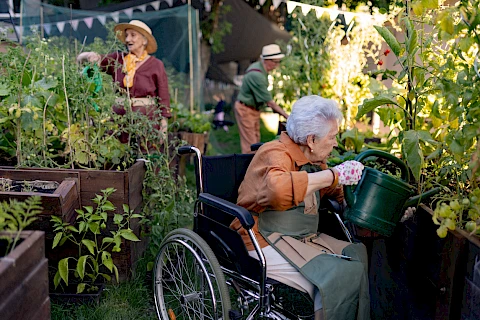
Gardening is a joyous activity that offers countless benefits, especially for seniors. It provides a wonderful way to stay active and enjoy the beauty of nature. For seniors, staying connected to nature boosts both physical and mental well-being. Even as our bodies change with age, adaptive gardening techniques can make this fulfilling hobby accessible and enjoyable. Adaptive gardening involves simple modifications that allow seniors to continue gardening comfortably and safely.
Benefits of Gardening for Seniors
Gardening isn't just about growing plants; it's also about nurturing health and happiness. Gardening can improve flexibility, strength, and stamina. Tending to the garden provides a gentle exercise that can enhance cardiovascular health and reduce the risk of chronic health problems. Gardening reduces stress and anxiety and provides a sense of accomplishment. It's a therapeutic activity that can lift spirits and promote relaxation. Gardening can bring people together.
Adaptive Gardening Techniques
Raised beds are easier on the back and knees, reducing the need to bend or kneel. They also offer better control over soil quality and drainage. Raised beds can be purchased or built. Position them at a comfortable height, ideally between 24 and 36 inches, on patios or lawns. Ergonomic tools are designed to reduce strain on the body. They are lightweight and have soft grips, making them easier to use for longer periods. Look for ergonomic pruners, trowels with padded handles, and long-handled weeders. These tools are widely available at garden centers and online. Container gardening allows plants to be grown in pots or other containers, which can be placed at convenient heights. It is ideal for smaller spaces such as balconies or patios.
Safety Tips for Senior Gardeners
You should always have water on hand and drink regularly. Wear a hat, sunglasses, and sunscreen to protect against sunburn. You want to lift with your legs, not your back. Use a garden cart or wheelbarrow to transport heavy items. Don't overdo it. Take frequent breaks, sit in the shade to rest, listen to your body, and pace yourself to avoid fatigue.
Getting Started With Adaptive Gardening
You should consider what physical limitations you may have. Choose gardening activities and tools that accommodate those needs. You want to design your garden layout to minimize walking and bending and place commonly used tools and plants within easy reach. Choose plants that are easy to care for, such as herbs, flowers, and vegetables that do well in your local climate.
Community Resources and Support
Local gardening clubs and groups: Join a club or group to meet fellow gardening enthusiasts. These groups often share resources and offer support. Many community centers offer gardening classes tailored to seniors. These can provide valuable information and hands-on experience. The internet is a vast resource for gardening tips and advice. Join online forums and social media groups to connect with a wider gardening community.
Senior Helpers Visalia Encourages Seniors to Enjoy Gardening
Adaptive gardening opens up a world of joy and fulfillment for seniors. It offers physical exercise, mental relaxation, and social opportunities while keeping you connected to nature. Don't let age stop you from enjoying the beauty and rewards of gardening. Whether you're just starting or have been gardening for years, adaptive techniques can make the experience more accessible and enjoyable. For assistance and support in Visalia, Hanford, Tulare, Kings County, and Tulare County, contact Senior Helpers Visalia.